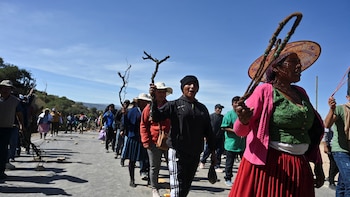
After the controversy that the candidate Gustavo Petro's proposal for “social pardon” has aroused, the member of the Historical Pact published a video in which he clarified the rumors that have emerged on social networks about a mass outflow of prisoners convicted of corruption within his government plan.
He also assured that he rejects the “clumsy idea” of the search for reconciliation to a “reduction of penalties for the corrupt” and assured that he will not do so “even in a nightmare” would it occur to reduce penalties for the corrupt, Petro said.
“Other rivals if you have them as allies and ready to wield power. We are those corrupt condemned prisoners,” said the candidate, who recalled in the video that the investigations he did as a senator led many to prison.
Petro recalled that the people with whom they try to link him are characters “defeated” without any political wealth “who thinks that he seeks to benefit those who I myself helped to imprison, if not those who do have real relations with paramilitarism, corruption and drug trafficking.”
The presidential candidate also argued that there is currently not a single investigation against him for corruption. “My whole political life is dedicated to imprisoning corrupt people”
Finally, he recalled that his brother (Juan Fernando Petro) is not part of the campaign nor does he belong to any management position, clarifying that his work is linked to the interchurch commission on justice and peace.
For his part, Gustavo Petro's head of debate, Alfonso Prada, published a series of trills in which he explained that “these smear strategies are used, manipulating facts, supported by statements by criminals and against all logic or reason. Who would think of going to get votes from the Moreno sentenced to 25 years in prison for corrupt? What votes?”
He clarified that “there was naivety and clumsiness in that untimely visit from Petro's brother, right. What IS FALSE is that he went in the name of the campaign to offer penalty reductions in exchange for votes. False and incoherent! It's illogical and a liar.”
Prada concluded that “it is false of all falsehood. The campaign has NOT gone to prisons to negotiate anything. Nor are we going to do it. Corrupt in jail and have them return what was stolen and that's it. Respect for the law, period. Now to move forward with our agenda for Change for Life and Peace.”
Reactions to the meeting
Several personalities in the country, such as Petro's electoral opponents (Sergio Fajardo, Federico Gutiérrez, Enrique Gómez, among others) have made public their positions against the idea of “social forgiveness” promoted by the progressive candidate.
All these remarks led Petro, through several threads on his Twitter profile, to say that violence in the country must be ended through this forgiveness. Moreover, he says that “the only way to settle the wounds is through an immense global forgiveness,” he said through his Twitter account.
The former mayor of Bogotá responded to a journalist who analyzed his controversial proposal and concluded that what the candidate is allegedly seeking is to win votes in these sectors. These premises prompted Petro's response, who explained how this pardon would work for criminals like the ones his brother recently visited in La Picota prison, south of the capital.
“It's not about how we forgive the ñoño (condemned by Odebrecht), it's about how we forgive each other as a society, in each specific territory, so as not to continue killing each other. To end the violence for good,” Petro said.
Moreover, he even described several of the alleged qualities that the social forgiveness he proposes for Colombia would bring with it and that has caused severe attacks against him from most sectors of society. “Social forgiveness is not impunity, it is reparative justice. Social forgiveness is not a cover-up, it is a process of historical truth. Social forgiveness is neither legal nor divine, it is an earthly forgiveness of citizenship. Social forgiveness is not ordered by the president, but by society,” he added.
KEEP READING:
Últimas Noticias
Debanhi Escobar: they secured the motel where she was found lifeless in a cistern
Members of the Specialized Prosecutor's Office in Nuevo León secured the Nueva Castilla Motel as part of the investigations into the case

The oldest person in the world died at the age of 119
Kane Tanaka lived in Japan. She was born six months earlier than George Orwell, the same year that the Wright brothers first flew, and Marie Curie became the first woman to win a Nobel Prize

Macabre find in CDMX: they left a body bagged and tied in a taxi
The body was left in the back seats of the car. It was covered with black bags and tied with industrial tape
The eagles of America will face Manchester City in a duel of legends. Here are the details
The top Mexican football champion will play a match with Pep Guardiola's squad in the Lone Star Cup

Why is it good to bring dogs out to know the world when they are puppies
A so-called protection against the spread of diseases threatens the integral development of dogs




